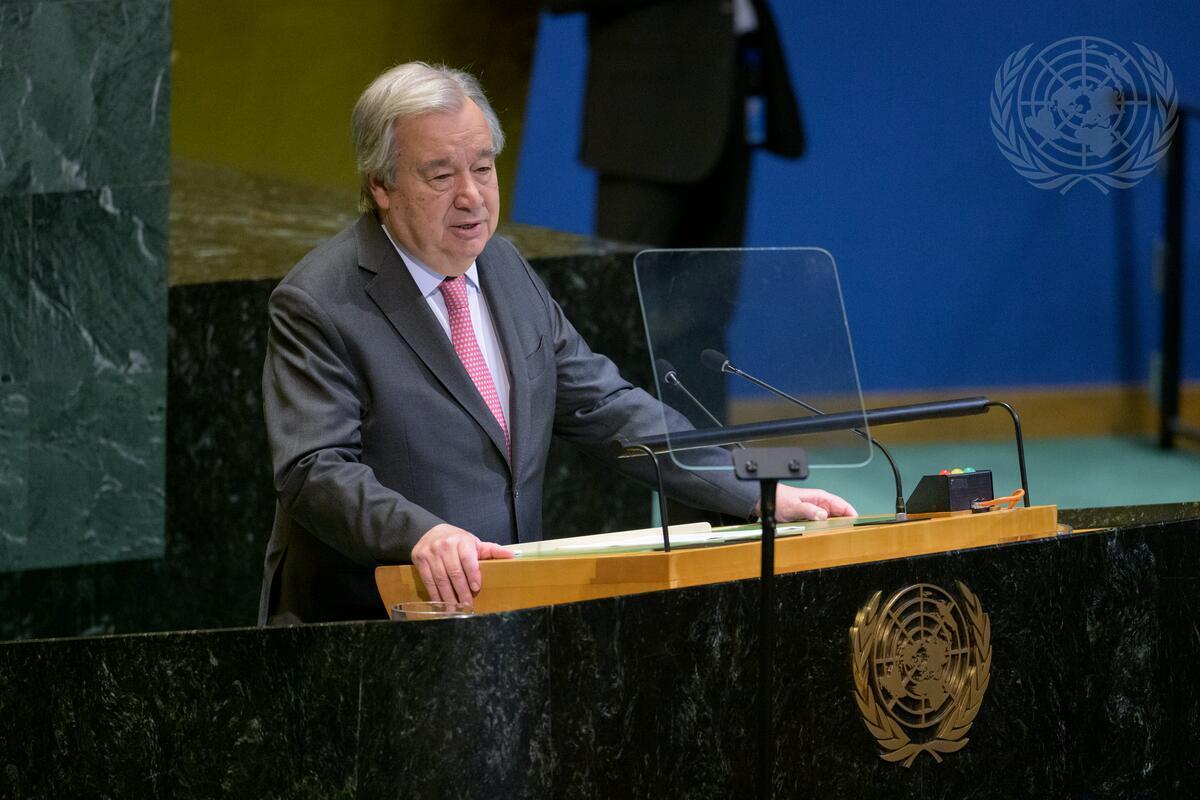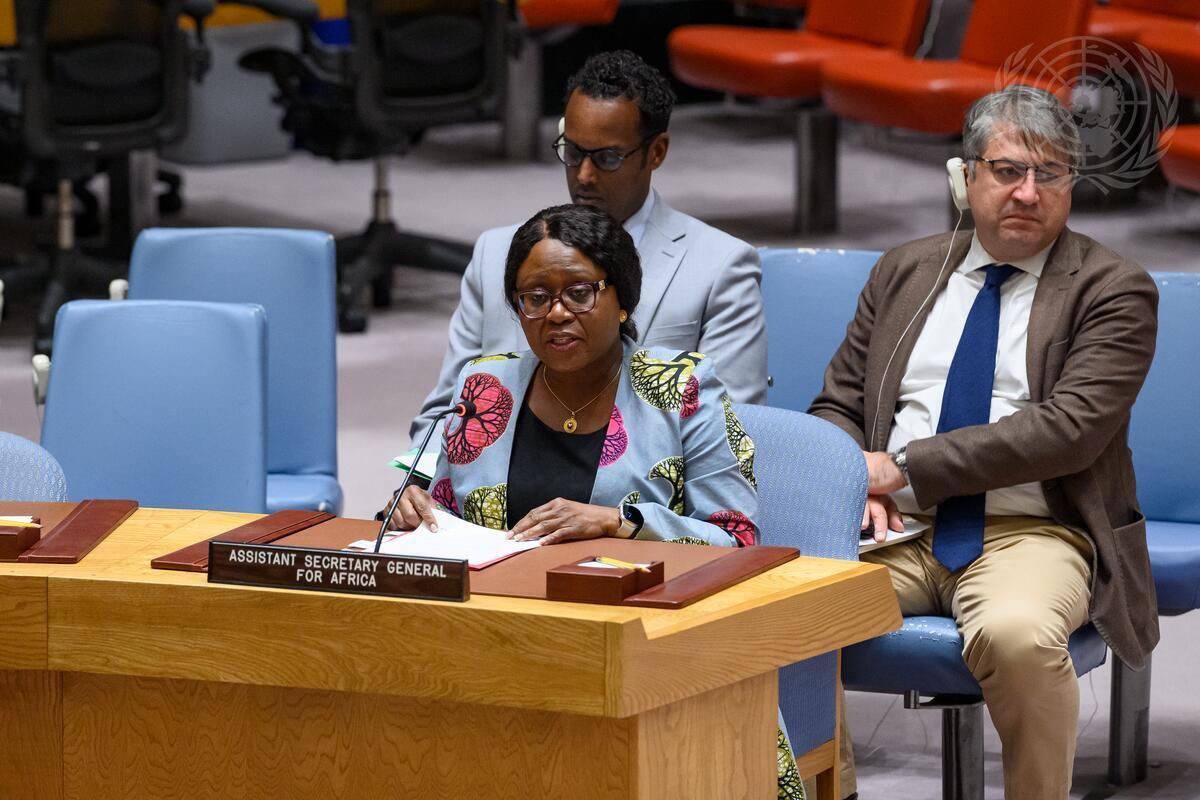Thank you very much. Mr. President, Members of the Council, I thank you for the opportunity to brief you, once again on the situation in Sudan.
I just returned from the Paris Conference which clearly demonstrated continued international support to Sudan’s return to the international community. I want to thank the Government of France for organizing this conference at which member states announced bilateral debt forgiveness, helping Sudan to clear its arrears with the international financial institutions and paving the way for getting closer to the HIPC Decision Point and debt relief. I also want to thank the Sudanese - women and men, civil society and businesspeople who were there and articulated their vision of a new Sudan – based on freedom, justice and economic opportunity. Prime Minister Abdalla Hamdok reiterated his commitment to peace and to creating an environment for business investments and General al-Burhan, Chair of the Sovereign Council affirmed his pledge to a democratic transition and good neighbourly relations.
I encourage all of Sudan’s international and domestic partners to continue supporting Sudan as it implements key economic and political reforms. The economic and the political dimensions of Sudan’s transition are interdependent and actually inseparable.
Let me, Mr. President, sketch out some of the recent developments in the Sudan – achievements as well as challenges – and begin with the peace process.
On 28 March the Chairman of Sudan’s Sovereign Council, Gen. al-Burhan, and the Chairman of the Sudan People Liberation Movement – North Abdelaziz al-Hilu faction, signed the Declaration of Principles, on the basis of which peace talks between the Government and the SPLM/N al-Hilu faction are scheduled to begin next week in Juba, South Sudan. I commend both parties’ courage in making important compromises to reach this stage.
I have met with Abdelaziz al-Hilu, with the Government and with the South Sudanese mediation team, to discuss preparations for the upcoming talks. UNITAMS will act as a facilitator here, supporting the role of South Sudan as a mediator as well as the parties where required. We are also working to ensure meaningful participation of women in the process and at the talks.
In Juba, I also met and discussed with SLA leader Abdulwahid al-Nur, the leader of one of the other main non-signatory factions, and I discussed with him the need to engage politically with the Government of Sudan for a comprehensive peace.
Mr. President,
Let me also note the Government’s efforts to advance the political transition. This includes the adoption of the legislation establishing the Peace Commission, the Anti-corruption Commission, the Transitional Justice Commission and others, and these are all important steps. I urge the authorities to proceed rapidly in also operationalizing these entities while ensuring that they reflect the diversity of Sudan.
No doubt there are also delays in the transition process. Most importantly, this applies to the formation of an inclusive and representative Transitional Legislative Council with at least 40 percent female participation – this has yet to be realized.
Recent commemorations of the violent suppression of anti-regime protests in 2019 and the tragic death of two young men have underscored growing frustrations with unfulfilled expectations of the political transition, including the quest for justice and accountability.
And while there are great concerns with the limited progress in implementing the Juba Peace Agreement, the JPA, there has been progress in some areas such as the launch of the technical preparations for the Governance Conference and preparations for the establishment of the Monitoring and Evaluation Mechanism for the Juba Peace Agreement. Other critical aspects remain unfulfilled so far, notably the establishment of the Ceasefire Committees and other security arrangements.
Delays in establishing the Joint Protection Force and the absence of integrated and united armed forces, one army, that is, have a direct bearing on Protection of Civilians and overall stability.
You will, Mr. President, recall my last briefing here in April, after the latest resurgence of intercommunal clashes in Darfur which left 144 people dead and an estimated 65,000 displaced.
In response to these tragic events, the government decided at the time to implement eight critical security measures including the deployment of the joint protection force; the operationalization of the ceasefire committees; weapons management; and humanitarian relief.
Meanwhile the armed movements have named their representatives to the ceasefire committees and they have identified personnel for the joint protection force, but deployments have yet to commence. Some delays in deploying the joint protection force are reportedly due to a lack of resources; and material international support for these joint forces, including support for housing and equipment, would certainly be welcomed.
I fear that without the speedy establishment of these Joint Forces, and the implementation of Sudan’s National Plan for the Protection of Civilians, we could see similar incidents like El Geneina be repeated.
In my meetings with Sudanese leaders, I welcome their commitment to implementing security sector reform. UNITAMS stands ready to assist in this. I also continue to urge the establishment of the ceasefire committees and related mechanisms which the Juba Peace Agreement foresees. UNITAMS is fully prepared to support these measures, not least so as the UN role in these mechanisms has been agreed upon in the Juba Peace Agreement.
UNITAMS and the UN Country Team are supporting the Government’s National Plan for the Protection of Civilians, focusing on prevention and on enabling a protective environment. This includes the strengthening of the judiciary, which is a UN priority. UNITAMS itself has deployed three multi-functional teams of police advisors to Darfur to support the Sudanese police in community policing, investigations, addressing gender-based violence and protection of civilians. And our efforts towards the protection of civilians will definitely continue to grow as we increase our own capacity.
Mr. President,
Sudanese women continue to demand the full realization of their rights. and the women’s march last month brought attention to disparities in women’s safety, basic needs, legal rights and political participation.
I was deeply disturbed by continued reports of human rights violations against women and girls including social media campaigns instigating violence. Women’s rights activists point to the fact that such crimes were unacceptable during the revolution and should be unacceptable today. I cannot agree more.
The decision of the government to ratify the Convention on the Elimination of Discrimination Against Women as well as the Protocol to the African Charter on Human and Peoples’ Rights on the Rights of Women in Africa were an important steps forward – despite the reservations on core provisions which Sudanese women’s rights activists have criticized.
UNITAMS, my Mission, will continue to support women’s rights groups and the Government to create an environment where women can live free of fear for their safety and exercise their full rights.
Mr. President,
On regional matters, I continue to urge dialogue to address the differences and tensions between Sudan and Ethiopia. Dialogue and cooperation remain the only way to amicably resolve these differences.
With regard to international cooperation, I am pleased to report that agreement has been reached on the establishment of what we call the Sudan National Development Forum as a donor state coordination mechanism. The Government intends to launch this forum in the coming month. The UN has also made significant progress in the development of benchmarks and indicators, which you will find as an annex to the Report of the Secretary-General. The benchmarks will measure progress against strategic priorities across the four pillars of our mandate. We have had a first discussion with the government and will launch a “roadshow” as we call it to discuss these benchmarks with civil society actors in different parts of the country.
Let me also thank the Government and the United Nations Office of Legal Affairs for their diligent work on the Status of Mission Agreement. I had a long phone call earlier today with the Foreign Minister and I can report to you that the SOMA, the Status of Mission of Agreement, is now ready for signature once both the Minister and I are back in Khartoum.
To conclude Mr. President,
Sudan’s fragile transition can only succeed in realizing the aspirations of the Sudanese people with the continuation of the same spirit of unity, partnership and collaboration that started the revolution. I have continued my outreach with diverse stakeholders: government, political parties, armed movements, civil society, women, youth and others across Sudan both to explain our mandate and also to address the skepticism which we have encountered among parts of the political and societal spectrum at the outset. One of the key messages remains that while we expect all parts of Sudan to work together, UNITAMS works for all of Sudan.
Thank you.






